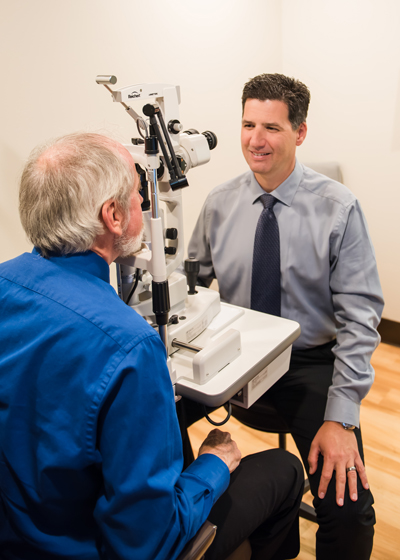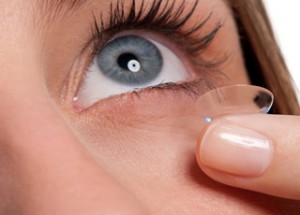Comprehensive Eye Examinations

We know your vision is extremely important to you – and we want to help you see your very best. Our doctors work patiently with you to determine the type of visual correction that will best suit your needs and lifestyle.
An eye exam is much more than determining a prescription for eyeglasses. Our comprehensive eye exam will check your eyes inside and out to detect any vision problems or eye diseases. The eye health evaluation includes assessment for glaucoma, cataracts, dry eyes, allergies, as well as a retinal examination for macular degeneration, diabetic eye disease or other retinal disorders. We are prepared to handle your unique eye care needs and will use the latest technology to detect and treat any vision or other eye problems.
Contact Lens Fittings
Our expert doctors will find the contact lenses that are just right for you. Whether it be soft, toric, gas permeable, multifocal or monovision, our doctors will take the time to fit you with lenses that provide the best comfort and vision. We are committed to using the latest and greatest contacts to ensure your success!

During the fitting process, follow-up visits are necessary to adjust and fine-tune the contact lens prescription to optimize vision and comfort. Annual eye and contact lens evaluation is necessary to renew contact lens prescriptions by law.
Specialty Contact Lens Services
Specialty lenses, including RGP (rigid gas permeable) and scleral contact lenses, are a method of vision correction that can greatly benefit patients with irregular corneas (the front surface of the eye) which may result from conditions such as keratoconus, post-LASIK ectasia, and corneal transplants. In these cases, the irregularity of the cornea causes extreme astigmatism and distorted vision not correctable by glasses or traditional soft contact lenses. Specialty lenses work by providing a new surface for light to enter the eye in a regular manner.
Our doctors are experienced in fitting these custom specialty contact lenses. We are fortunate to have a topographer in our San Luis Obispo office, which collects thousands of data points across your eye to map out the surface of your cornea. Gathering this data is the first step in the journey to create a highly customized contact lens to provide you with your best vision!
Click here to learn more about contact lenses.→
Infant & Children’s Vision
Did you know the American Optometric Association recommends your child’s first eye exam take place during the first year of life? Vision or other ocular problems must be detected and treated early on in order to ensure proper visual development. Amblyopia (lazy eye) can cause permanent vision loss unless it is diagnosed and treated at a young age. Additionally, certain visual disorders can hinder a child’s ability or willingness to learn and can be frustrating both for the child and the parents.
Our doctors actively participate in local school vision screenings. Although screenings can pick up gross vision problems, a comprehensive eye examination is necessary to fully assess eye health and vision. We are experienced in the area of pediatric vision and will carefully examine your child’s eyes in a fun and engaging way. We also participate in InfantSEE, a public health program that provides a free eye examination during the first year of life.

Myopia Control
Myopia (nearsightedness) occurs when the length of the eyeball grows too long relative to the focusing power of the eye, resulting in a blurry image. While the blurry image is easily correctable by glasses or contact lenses, the presence of myopia increases the risk for development of other diseases such as glaucoma, retinal detachment, and maculopathy. Myopia can often be progressive in children (expected to increase by 0.5 to 1 unit of nearsightedness per year), and higher degrees of myopia carry greater risk for these pathologies.
While the cause of myopia is still unclear, there are now proven methods that optometrists can employ to slow down or possibly even stop the progression of myopia. These methods include atropine eyedrops, soft multifocal contact lenses, and rigid overnight orthokeratology contact lenses. Each of these options have their own unique benefits, and our doctors can explore these various options with you to determine the best fit for your child’s lifestyle.
Click here to learn more about the various myopia control options.→
Treatment of Eye Diseases & Injuries
We treat ocular emergencies such as infections (“pink eye”), allergies, corneal foreign bodies, corneal abrasions and contact lens-related complications. Our doctors also diagnose and manage eye conditions such as dry eye, eyelid disease, cataracts, glaucoma, macular degeneration and diabetic retinopathy.
Laser Vision Correction (LASIK)
If you are reliant on glasses or contacts, you may be questioning whether LASIK surgery is right for you. While not everyone is a good candidate for LASIK, with the latest advancements in technology, the procedure has become more precise with better visual results and faster healing time than ever before. We are happy to discuss the procedure with you and make recommendations.
LASIK/Cataract Surgery Co-management
Because our office is an independent optometric practice, we have the ability to pick and work with the finest surgeons and can help you make an informed decision in choosing an eye surgeon. We can make recommendations and discuss the surgery options that will best suit you and your lifestyle. Our doctors are knowledgeable about the latest surgical techniques and options. We offer consultations as well as preoperative and postoperative care for cataract and LASIK surgeries.
Low Vision Rehabilitation
Low Vision is a partial loss of vision that is not adequately correctable with glasses, contact lenses, medications or surgery. Common causes of low vision include macular degeneration, diabetic retinopathy, inherited retinal diseases and glaucoma. Visual impairment does not have to diminish your quality of life or lead to a loss of independence. A low vision evaluation differs from a routine eye exam in that it focuses on how you function visually in day-to-day life.
The goal of our evaluation is to help patients obtain information, services and low vision devices that enable them to use their residual vision and continue daily living tasks and hobbies. Low vision aids, such as special magnifiers, telescopic devices and electronic systems may be prescribed to enhance vision.

